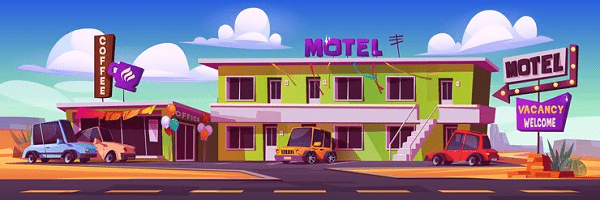Motels- Motels are a type of accommodation typically found along highways, main roads, and in suburban areas. The word “motel” is a portmanteau of “motor” and “hotel,” reflecting their design and purpose. Here are some key features and characteristics of motels:
- Location: Motels are often situated near major roadways, making them convenient for travelers who need a place to rest during long road trips. Their proximity to highways and main routes makes them easily accessible to motorists.
- Parking: Motels typically offer ample parking space right outside the rooms or units. This allows guests to park their vehicles near their accommodations for easy access.
- Layout: Motel rooms are usually arranged in a one- or two-story building with exterior corridors and entrances directly from the parking lot. This design allows guests to park their vehicles right outside their rooms.
- Room Types: Motels offer a range of room types, from single rooms with basic amenities to larger units with multiple beds and additional features like kitchenettes.
- Basic Amenities: Motel rooms typically include essential amenities such as a bed, bathroom, and basic furnishings. Some motels may also offer additional amenities like televisions, mini-fridges, and microwaves.
- Price: Motels are often more budget-friendly compared to traditional hotels, making them a popular choice for travelers looking for affordable accommodations.
- Short Stays: Motels are well-suited for short stays, such as overnight stops during road trips. They are designed to provide a convenient and comfortable place to sleep and refresh.
- No Frills: While some motels may offer additional amenities like swimming pools or continental breakfasts, they are generally more no-frills compared to upscale hotels. Guests typically won’t find on-site restaurants or extensive recreational facilities.
- Independence: Motel stays offer a level of independence and privacy, as guests can access their rooms directly from the parking lot without going through a lobby or common areas.
- Safety: While motels are generally safe, it’s important for travelers to exercise caution and choose reputable establishments, especially when staying in unfamiliar areas.
It’s worth noting that the quality and amenities of motels can vary widely, so it’s a good idea to read reviews and check ratings before booking a stay. Some motel chains are known for providing consistent quality and service standards, while independently owned motels may offer a more unique experience.
What is Motels
A “motel” is a shortened term for “motor hotel.” It is a type of lodging establishment designed primarily for travelers with automobiles, especially those on long-distance road trips. Motels are typically located along highways, main roads, or in suburban areas, making them easily accessible to motorists. The key features and characteristics of motels include:
- Parking Accessibility: Motels are known for their convenient parking arrangements. Guests can park their vehicles directly in front of or near their motel room, often just a few steps away from their door.
- Exterior Corridors: Unlike traditional hotels, motels typically have exterior corridors, meaning that guest rooms have doors that open directly to the outside, rather than into an interior hallway.
- Basic Amenities: Motel rooms typically include essential amenities such as a bed, bathroom, and basic furnishings. Some may also provide additional amenities like televisions, mini-fridges, microwaves, and coffee makers.
- Affordability: Motels are often more budget-friendly than full-service hotels, making them a popular choice for travelers looking for a cost-effective place to stay, especially during road trips.
- No Frills: While some motels may offer extra features like swimming pools or continental breakfasts, they are generally more basic and no-frills compared to upscale hotels. You won’t typically find on-site restaurants or extensive recreational facilities at motels.
- Short Stays: Motels are well-suited for short stays, such as overnight stops during long journeys. They are designed to provide a comfortable and convenient place to rest and refresh.
- Independence: Staying at a motel provides a level of independence and privacy, as guests can access their rooms directly from the parking lot without having to go through a lobby or common areas.
It’s important to note that motels can vary widely in terms of quality and service, so it’s a good idea to read reviews and check ratings when booking a stay. Some motel chains are known for maintaining consistent quality and service standards, while independently owned motels may offer a more unique experience. The concept of a motel was developed to cater to the needs of travelers seeking convenient, affordable, and car-friendly accommodations.
Who is Required Motels
The Motels are an American new wave band formed in Berkeley, California, in 1971. They are best known for their hit songs in the late 1970s and early 1980s, including “Only the Lonely” and “Suddenly Last Summer.” The band’s original members included lead singer Martha Davis, guitarist Dean Chamberlain, bassist Richard D’Andrea, keyboardist Robert Newman, and drummer Brian Glascock.
Martha Davis, with her distinctive voice and stage presence, was the band’s frontwoman and primary songwriter. The Motels gained popularity for their blend of new wave and pop-rock sound, and they released several albums during their career. Some of their notable albums include “The Motels” (1979), “Careful” (1980), and “All Four One” (1982).
“Only the Lonely” was one of their biggest hits, reaching the Top 10 on the Billboard Hot 100 chart in 1982. The Motels’ music was characterized by Martha Davis’s emotive vocals and the band’s atmospheric, sometimes moody sound.
The lineup of The Motels has changed over the years, with Martha Davis being the constant presence in the band. They continue to tour and perform, and their music from the late 1970s and early 1980s remains a part of the new wave and alternative rock music legacy.
Where can i learn Motels

If you’re interested in learning more about motels, motel management, or the hospitality industry in general, there are several avenues you can explore:
- Hospitality Management Programs: Many colleges and universities offer hospitality management programs that include coursework on lodging and motel management. These programs cover topics such as hotel and motel operations, marketing, finance, and customer service. Consider enrolling in a relevant degree program if you’re looking for in-depth education.
- Online Courses: Numerous online platforms offer courses related to hospitality management and motel operations. Websites like Coursera, edX, and Udemy provide a variety of courses and certifications that can help you gain knowledge in this field at your own pace.
- Books and Publications: There are many books and publications available that focus on the hospitality industry, including motels. Look for textbooks, guides, and industry-specific literature to deepen your understanding.
- Industry Associations: Consider joining hospitality industry associations like the American Hotel & Lodging Association (AH&LA) or the International Hotel & Restaurant Association (IHRA). These organizations often provide resources, training, and networking opportunities for those interested in the field.
- Networking: Attend hospitality and motel industry events, conferences, and seminars to network with professionals and learn from experts in the field. Networking can be a valuable source of knowledge and opportunities.
- Online Resources: There are various websites, blogs, and forums dedicated to the hospitality industry where you can find articles, discussions, and insights into motel management and related topics.
- Work Experience: If you’re considering a career in motel management, gaining practical experience by working in the industry can be one of the most valuable ways to learn. Start by working in entry-level positions in motels or hotels and gradually work your way up to gain hands-on experience.
- Consulting and Training Firms: Some consulting and training firms specialize in hospitality and motel management. They may offer seminars, workshops, and consulting services to help you learn about motel operations.
Remember that the hospitality industry is dynamic, and staying updated on the latest trends, technologies, and best practices is essential. Learning from a combination of formal education, practical experience, and ongoing professional development can provide you with a well-rounded understanding of motel management.
How do I start Motels
Starting a motel involves several steps and considerations. Here is a general outline of the process:
- Market Research:
- Research the location: Identify a suitable location for your motel. Consider factors like proximity to highways, tourist attractions, and business centers.
- Analyze the competition: Study existing motels in the area to understand their pricing, services, and occupancy rates.
- Identify your target market: Determine the type of guests you want to attract, such as business travelers, tourists, or long-term guests.
- Business Plan:
- Create a detailed business plan that outlines your motel’s concept, goals, budget, and revenue projections.
- Include a marketing plan to attract guests and establish a presence in the market.
- Legal Requirements:
- Register your business and obtain the necessary permits and licenses. This includes zoning approvals, health permits, and a hotel/motel license.
- Financing:
- Secure the necessary funding to start and operate your motel. This can come from personal savings, loans, investors, or grants.
- Property Acquisition or Development:
- Acquire an existing motel property or develop a new one. If you’re renovating or building from scratch, ensure that the property complies with zoning regulations and building codes.
- Construction and Renovation:
- If necessary, renovate or build the motel according to your specifications. This may include guest rooms, a lobby, parking areas, and amenities like a pool or fitness center.
- Furnishing and Equipment:
- Furnish guest rooms and common areas with appropriate furniture, fixtures, and equipment. Ensure that rooms are comfortable and meet safety standards.
- Staffing:
- Hire and train staff, including front desk clerks, housekeepers, maintenance workers, and managerial personnel.
- Establish standard operating procedures for your motel.
- Marketing and Promotion:
- Develop a marketing strategy to promote your motel. This may include creating a website, social media presence, and online booking capabilities.
- Consider partnerships with travel agencies or online booking platforms.
- Offer special promotions or discounts to attract guests during the initial launch.
- Operations:
- Start accepting reservations and hosting guests.
- Maintain the property and ensure high standards of cleanliness and service.
- Monitor guest feedback and make improvements as needed.
- Financial Management:
- Keep meticulous records of income and expenses.
- Manage your finances to ensure profitability and sustainability.
- Compliance and Regulations:
- Stay updated on local, state, and federal regulations related to the hospitality industry, taxes, and safety standards.
Starting and running a motel is a complex undertaking that requires careful planning, management, and ongoing commitment. Seek professional advice and consider hiring experts in the hospitality industry to help you navigate the various aspects of motel ownership and management. Additionally, conducting thorough market research and providing excellent customer service will be crucial for your motel’s success.
Case Study on Motels
The Riverside Motel
Background: The Riverside Motel is a small, family-owned motel located in a picturesque riverside town. It has been in operation for several decades and is known for its quaint charm and scenic views. However, in recent years, the motel has faced challenges due to increased competition from larger chain hotels and changing guest expectations.
Challenges:
- Increased Competition: A new chain hotel recently opened in town, offering more amenities and a modern experience. This has led to a decline in bookings at the Riverside Motel.
- Aging Infrastructure: The motel’s rooms and facilities are starting to show signs of wear and tear. Many guests have complained about outdated décor and the need for renovations.
- Online Presence: The Riverside Motel has limited online visibility. It lacks a user-friendly website, online booking capabilities, and a presence on popular travel and review websites.
- Marketing and Promotion: The motel’s marketing efforts have been limited to local advertising and word-of-mouth. It needs to expand its reach to attract tourists from nearby cities and towns.
Strategies and Solutions:
- Renovation and Modernization: The Riverside Motel decides to invest in renovating its rooms and common areas. This includes updating furnishings, improving room amenities, and enhancing the overall guest experience.
- Online Presence: The motel hires a web developer to create a user-friendly website with an online booking system. They also claim and optimize their profiles on review platforms like TripAdvisor and Google My Business.
- Targeted Marketing: To attract more guests, the motel starts targeting nearby cities and promotes its scenic location as a peaceful getaway. They launch digital marketing campaigns and offer special packages, such as romantic weekend getaways and outdoor adventure packages.
- Guest Experience: The Riverside Motel focuses on providing excellent customer service. They train their staff to be friendly and helpful, offer complimentary breakfast, and provide information about local attractions and activities.
- Feedback and Improvement: The motel actively seeks feedback from guests through surveys and online reviews. They use this feedback to make continuous improvements to their services and amenities.
Results:
After implementing these strategies, The Riverside Motel begins to see positive results:
- Occupancy rates start to rise as more tourists discover the motel’s online presence and enticing packages.
- Positive reviews on travel websites attract more guests, leading to increased bookings.
- The renovated rooms and improved amenities receive favorable feedback from guests, encouraging repeat visits.
- The motel’s revenue and profitability gradually improve as it gains a competitive edge.
Conclusion:
In this case study, The Riverside Motel faced challenges due to increased competition and changing guest expectations. By investing in renovations, enhancing its online presence, and targeting specific markets, the motel was able to adapt to the changing landscape and improve its business prospects. It serves as an example of how small, independent motels can compete effectively in a competitive hospitality industry.
White paper on Motels
Title: “The Evolution and Future of Motels”
Executive Summary:
- Provide a brief overview of the white paper’s content and its significance.
- Summarize key findings and recommendations.
Table of Contents:
- Introduction
- Define the purpose and scope of the white paper.
- Explain the importance of motels in the hospitality industry.
- Provide an outline of the topics covered.
- History and Evolution of Motels
- Trace the origins of motels and their development over time.
- Highlight key milestones in the motel industry.
- Discuss the cultural and economic factors that shaped motels.
- Types of Motels
- Explore the different types of motels, from budget to boutique.
- Discuss the unique features and characteristics of each type.
- Provide examples of successful motel chains and independent motels.
- Challenges and Trends in the Motel Industry
- Analyze the challenges faced by motels in the modern hospitality landscape.
- Explore emerging trends, including technology integration, sustainability, and experiential stays.
- Discuss how motels are adapting to changing traveler preferences.
- Operations and Management
- Provide insights into the daily operations of motels.
- Discuss best practices in motel management, including guest services, housekeeping, and maintenance.
- Explore revenue management and pricing strategies.
- Marketing and Branding
- Examine marketing strategies for motels, both traditional and digital.
- Discuss the importance of branding and creating a unique identity.
- Provide case studies of successful motel marketing campaigns.
- Guest Experience and Service Quality
- Emphasize the significance of providing exceptional guest experiences.
- Explore ways motels can enhance customer service, from check-in to check-out.
- Highlight the role of online reviews and feedback in improving service quality.
- Technology in Motels
- Discuss the integration of technology in motel operations.
- Explore the use of online booking systems, mobile apps, and smart room amenities.
- Address cybersecurity and data privacy concerns.
- Sustainability and Environmental Responsibility
- Examine sustainable practices in motels, including energy efficiency and waste reduction.
- Discuss the benefits of eco-friendly initiatives for both motels and the environment.
- Showcase motels with successful sustainability programs.
- Future Prospects and Recommendations
- Offer insights into the future of motels and potential growth opportunities.
- Provide recommendations for motel owners and operators to stay competitive and thrive.
- Discuss the role of government policies and industry associations in supporting the motel sector.
- Conclusion
- Summarize key takeaways from the white paper.
- Reiterate the importance of motels in the hospitality industry.
- References
- Cite all sources and references used throughout the white paper.
Additional Sections (Optional):
- Case Studies: Include real-world examples and case studies of successful motels.
- Interviews: Conduct interviews with motel owners, managers, and industry experts for added insights.
- Appendices: Include supplementary data, charts, and graphs.
A comprehensive white paper on motels should provide valuable information for industry professionals, prospective motel owners, and anyone interested in the hospitality sector’s evolution and future trends.





